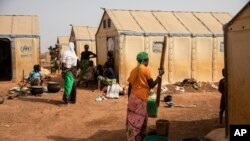An estimated 250 million people in Africa lack access to daily food, with the number impacted in west and central Africa expected to reach a record high. Officials and aid groups from more than 50 African countries meet this week in Equatorial Guinea to discuss ways of improving the continent’s agricultural food systems.
The U.N. World Food Program says the number of people affected by the ongoing food crisis in west and central Africa has quadrupled over the last three years, rising from 10.7 million in 2019 to 41 million today.
Countries in the Horn of Africa are also experiencing one of their worst food crises following three consecutive poor rainy seasons.
The food insecurity has caused a massive nutrition crisis, particularly among small children. It has also fueled a huge population displacement as people leave rural areas in search of better economic opportunities.
Many factors are at play. Extreme weather events such as drought and floods are occurring more regularly. In some countries, conflict prevents farmers from planting or harvesting crops.
As a result, many African countries have become increasingly reliant on food imports. So when the COVID-19 pandemic hit and disrupted global and regional trade, the continent suffered.
Abebe Haile-Gabriel is the assistant director general of the United Nations Food and Agriculture Organization.
“Each time a new crisis hits, it adds to what is already a very precarious situation. And the economic base is not very strong. Productivity and production of food is one of the lowest in the world. Not enough is being produced,” said Haile-Gabriel.
The situation has been further complicated by the war in Ukraine. More than 20 African countries depend on Ukraine or Russia or both for wheat imports, Haile-Gabriel said, including 13 which depend on the warring nations for more than half of their annual wheat supply. Many African countries are also heavily reliant on fertilizer imports from Russia.
Benoît Thierry is the West Africa representative for the International Fund for Agricultural Development.
“In Africa, not all countries are self-sufficient. Senegal is importing 50% of its food and we think that all the governments should now get organized to ensure self-sufficiency in their countries. And for that you need investment plans in agriculture,” he said.
Past agricultural plans have had a scope of three to five years, Thierry said, but governments should be thinking longer term.
At this week’s U.N. food conference, government officials are expected to discuss ways of decreasing Africa’s dependence on imports by providing emergency support to farmers, taking advantage of the African continental free trade agreement, and investing in ecosystem restoration and resource management.




